‘Yemen’s uprising was magical, spiritual, powerful’
But that all changed when government forces fired on peaceful protesters. A Yemeni demonstrator remembers that day.
![Children join a protest in Change Square, Sana’a, in August 2014 before president Abdrabbuh Mansur Hadi left the country [Laura Silvia Battaglia/Al Jazeera]](/wp-content/uploads/2021/04/IMG_5841.jpg?resize=770%2C513&quality=80)
Ten years ago today, government forces opened fire on protesters in Yemen’s capital, Sana’a, killing 12 people.
It was not the most deadly display of violence against protesters since demonstrations calling for the removal of the country’s dictator of 33 years, Ali Abdullah Saleh, had begun, but it was the moment when it became clear to many that he would refuse to cede power. As such, it marked a crucial turning point in the uprising.
Keep reading
list of 4 itemsTimeline: How the Arab Spring unfolded
Arab Spring Cartoon: Citizen Journalism from Syria to Sudan
The Arab Spring has been misunderstood
Taha al-Jalal, who I met in Sana’a in 2014 and later married after he moved to Italy, was 23 at the time and living at home in Sana’a with his parents and younger siblings. He was studying modern languages at the University of Sana’a, close to where the demonstrations had started in late January in an area that became known as “Change Square”.
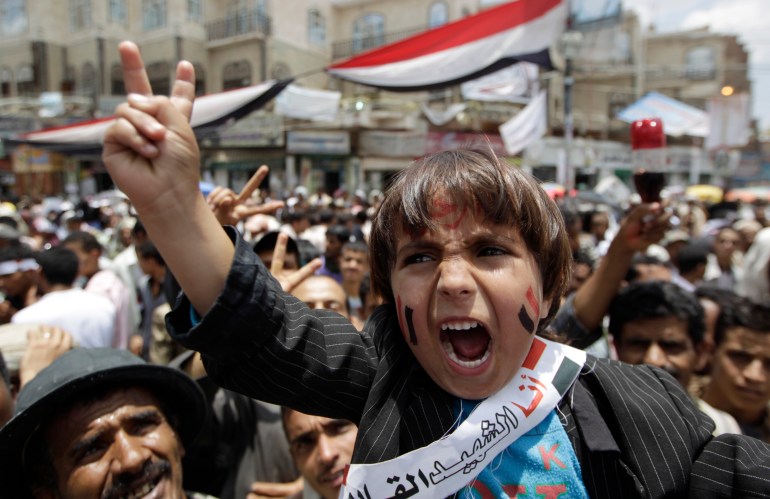
“The revolution began right next to the university – I was very close to the action,” Taha recalls of those early days. “Every day when I went to class and always passed the demonstrators, I said to myself ‘what are they doing here?’ And I got curious, I went over and I realised that they were protesting because everything was too expensive, and they couldn’t buy food.”
Taha started to join them and says he dreamed that a revolution could bring better representation for young people, a new constitution, access to work and fundamental rights.
At the time, he says, the atmosphere in Sana’a was “magical, spiritual, powerful”.
‘Brotherhood, belonging, belief’
Change Square had become a sea of colourful banners and flags as more and more people gathered to protest peacefully every day. Some of them pitched tents, organised the distribution of food and shouted chants and slogans.
“The presence of more and more women – determined, courageous – day by day was extraordinary,” says Taha. “It made the square safer, kinder and more peaceful. People were sure that protesting was the right thing to do and they would succeed in their intent, because change was being demanded by all the Arab people at that time.
“The verse of the Maghreb prayer of the protesters, ‘There is no God but God,’ was impressed in my mind. I can’t forget the sense of brotherhood, belonging – the belief that together, in one body, we would be able to recompose a country and free it from the dictator.”
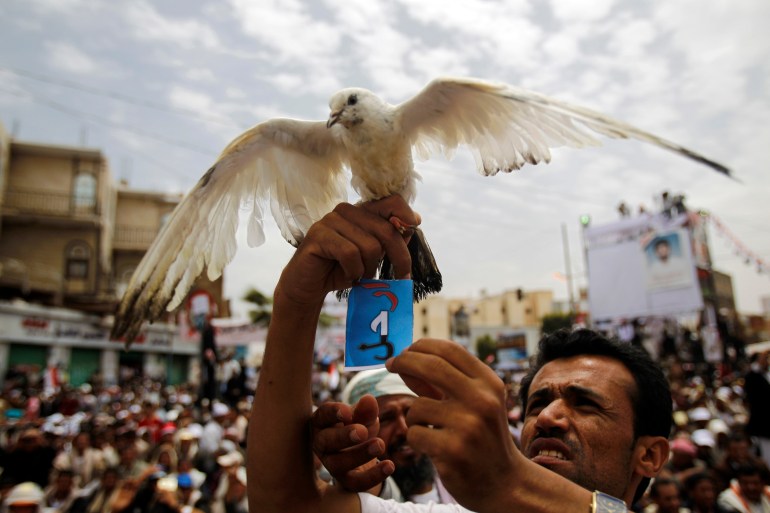
The first months of the protests were mostly peaceful.
“The more I went to the square, the more I saw the crowd grow. There were so many people. I was so excited to realise that it wasn’t just me who wanted change. There were also shows: it was like a carnival,” he says, his eyes shining at the memory.
“We would also pray in the midst of the protests but there was no water. I remember that among the protesters was a plumber, who managed to build mobile toilets so we could wash ourselves before the collective prayer.”
‘Haunted’ by survivor’s guilt
But that all changed on March 18, a day now known as the Friday of Dignity, when snipers on the roofs of nearby buildings opened fire on a crowd of protesters, killing 72 and wounding 400.
Saleh’s government denied responsibility, but Taha – who was among the crowd that day – says most people believed the snipers were security forces loyal to him.
“I just remember the sound of shots, and the people falling around me,” he says.
As hundreds of people ran in the direction of the shots, Taha decided to cut through the crowd in the opposite direction. “My family called me and said: ‘We are worried about you.’ I was about to leave the square and I had already reached the edge of the protests, when I found myself faced with hundreds of people running in the opposite direction. When I finally got home and I heard of the 72 dead, I felt guilty for not coming back to help during the attack.”
Taha says he is still haunted by this feeling of guilt because, on another day he might have stayed – and died alongside the others.
Mixed feelings of guilt and pride are common among Yemenis, Taha says now. “Families lived between two fluctuating feelings: fear for the lives of their children and pride in what they were trying to achieve. My mother advised me: ‘Stay home, don’t go, be careful, they will kill you.’ But I didn’t listen. I was pumped up and I knew I was doing the right thing. Being at the forefront of a revolution is better than standing behind it. Better to stay in the front line and die for a noble accident at the time.”
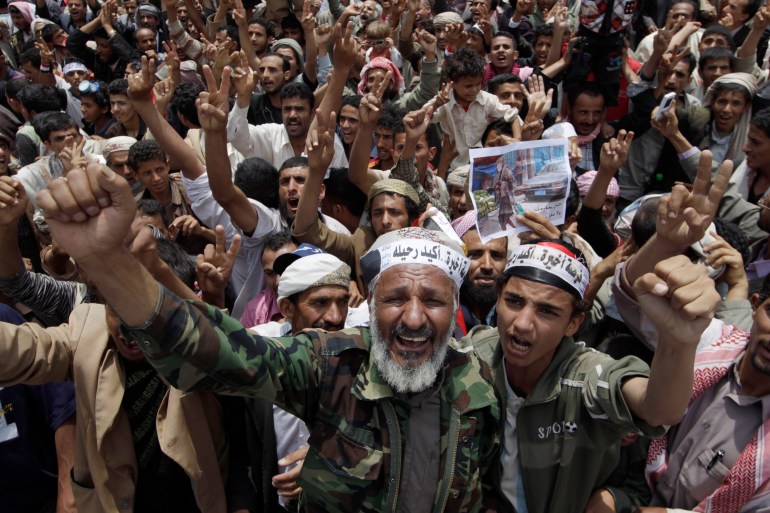
‘The robbery of hopes’
But on April 27, when Taha wanted to join the demonstrations as usual following Friday prayers, his mother refused to let him. She blocked the door “with her body and arms” in a way she had never done before, he recalls.
“My mom had never forbidden me to do anything before but, this time, she was determined – as if she felt the danger. I felt strange, I felt that this time she was right and so I didn’t go to the square,” he says.
“It wasn’t the first and it wasn’t the last act of violence. But this time I could have been among them. Later I watched the news on the local TV channels and on Al Jazeera: I was shocked.”
Taha says he remembers people’s anger most clearly. “The people chanted ‘liar, liar’, referring to the President, because on April 23, Saleh had indicated his acceptance of a plan proposed by the Gulf Cooperation Council countries which would have removed him from power and begun the transition to a new government.”
That Saleh ordered government forces to fire on the protesters was confirmation to many that he had no intention of abiding by the GCC agreement. Indeed on April 30, just three days later, sources close to him confirmed he had “reservations” about it. The following month he refused to sign it.
The plan required that Saleh step down 30 days after formally asking the prime minister to form a national unity government that would include members of the opposition, in exchange for a guarantee of immunity from prosecution for himself and his associates.
Saleh’s resignation one month later would then be followed by presidential elections. The plan was supported by the Yemeni opposition, although many protesters were angered by the provision granting Saleh immunity and went on strike over it.
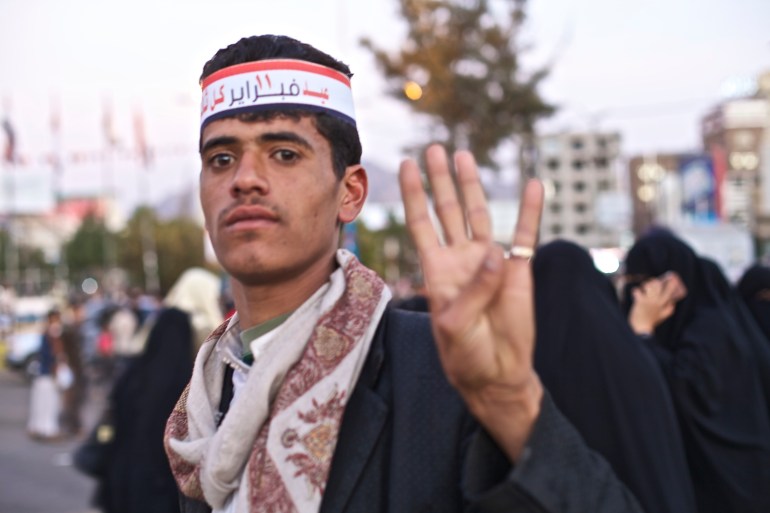
Ultimately, however, the plan fell apart when Saleh withdrew his support at the last minute and refused to sign the agreement in May. “In the days that followed Saleh’s refusal to sign the GCC agreement, heavy fighting broke out in Sanaa between pro-opposition tribal militias and troops loyal to Saleh, killing dozens,” Taha remembers. “This was for us, as young people, the first robbery of hopes inflamed by the revolution of 2011.
“April 27, 2011 would never have happened if our President had been wise and smart enough to admit that his time was gone and if he had resigned,” says Taha. “But his love for power never stopped, and the following six years of war in Yemen are the clear evidence of his misjudgement.”
Saleh was eventually ousted in 2012 and replaced as president by Abd-Rabbu Mansour Hadi. But Yemen’s conflict was far from over.
‘It was right to rise up’
At the end of 2014, Taha left Yemen, leaving his family behind, after another failed attempt by the GCC to broker peace between the government and opposition parties.
He had been working as a teacher at international schools in Sana’a, but when the GCC National Dialogue Conference failed, he says he “understood something bad was going to happen”.
“The signs were clear in 2014,” he says.
“I realised the only solution was to move abroad before it was too late. I was right.”
He managed to get a scholarship to Italy to study International Relations in Milan.
“It was hard, very hard. The only consolation today is I can help my family living in war from afar,” he says.
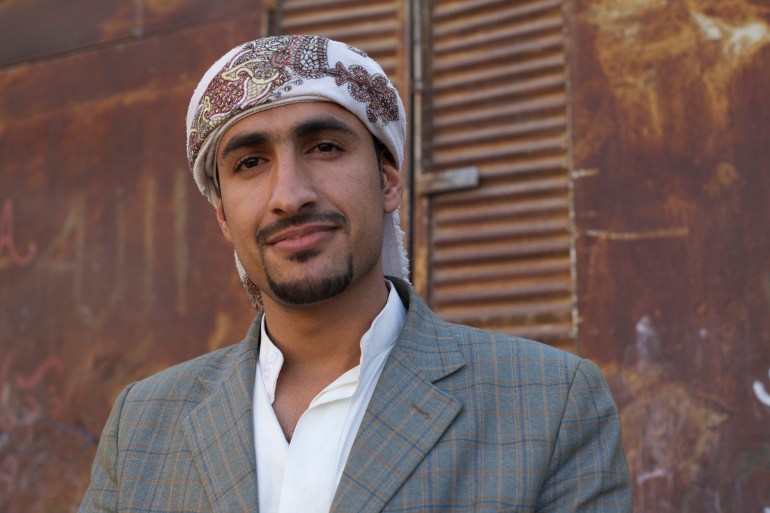
Today, Taha is living in Italy, where he works as a translator and a chef. He has a passion for cooking and film-making and has become a well-known YouTuber among the Yemeni population in Italy.
Yemen has descended into war and a humanitarian crisis, with tens of thousands killed and millions on the verge of famine.
With the rise of armed Houthi groups in the country in 2014, President Abd-Rabbu Mansour Hadi left Sana’a and asked the GCC for a military intervention. Towards the end of March 2015, the north of Yemen was heavily bombed by coalition forces led by Saudi Arabia, and its ports and airports were blockaded. The conflict has continued for six years, with Houthi rebels taking over much of Yemen, while fighting goes on between factions in the cities of Marib and Taiz.
Despite the devastation that has followed, Taha still believes it was right for the people to rise up against dictatorship back in 2011. “Some people in Yemen keep telling us that this revolution was a mistake. I say it wasn’t the wrong revolution.
“The mistake was not to hold firm to the principles of the post-revolution – don’t let it get stolen. Because the people who arrived after having occupied the square are those who stole the revolution from the young people. What I regret now is that the revolution accepted everyone, even those who then used it for their own ends [which led to civil war]. We were so stupid to accept every social body in the revolution, without defences”.